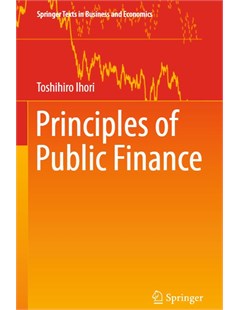Principles of Public Finance
This textbook equips instructors and students with an overview of the existing literature so that the latter can attain an overall understanding of macroeconomic and microeconomic public finance. The literature on public finance has grown dramatically with theoretical studies and empirical analysis, and much of the focus has been on macroeconomic effects of public services.
2017
This textbook equips instructors and students with an overview of the existing literature so that the latter can attain an overall understanding of macroeconomic and microeconomic public finance.
The literature on public finance has grown dramatically with theoretical studies and empirical analysis, and much of the focus has been on macroeconomic effects of public services. The standard textbook offerings, however, are mainly restricted to microeconomic topics of public finance.
This text intends to fill this gap by presenting a theoretical-based, comprehensive explanation of public finance. Particular emphasis is directed at developing tools that can be applied theoretically and empirically to clarify essential economic concerns in the current public sector in advanced countries, including Japan.
Such concerns include the macroeconomic effect of fiscal policy, the dependence on bonds for covering government deficits, and social security reform. The main text explains the standard concepts of public finance, and the appendix offers various advanced topics.
The material will facilitate an understanding of how to investigate changes in the public sector, interpret results, and basically do research on fiscal policy. The textbook will be of value to a broad range of course offerings, including those generally focused on fiscal policy, on social security reform and on tax reform..
Toshihiro Ihor, Principles of Public Finance, National Gradual Institute for Policy Studies, 2017.
 |  |  |
Thứ Sáu, 09:59 17/09/2021
Copyright © 2018 Hanoi University of Industry.